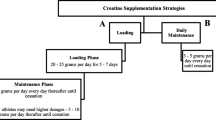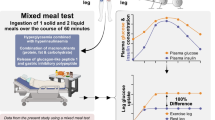Abstract
Objectives
To investigate the effect of 20 g protein with breakfast and evening meal on muscle mass, muscle strength and functional performance in older adults.
Design
A double-blinded randomized controlled study.
Setting
Oslo and Akershus University College of Applied Sciences, Norway.
Participants
Healthy community-dwelling men and women (≥ 70 years) with reduced physical strength and/or performance.
Intervention
Subjects were randomly assigned to receive either protein-enriched milk (2 x 0.4 L/d; protein group) or an isocaloric carbohydrate drink (2 x 0.4 L/d; control group) with breakfast and evening meal for 12 weeks.
Measurements
The primary endpoints were muscle mass measured by dual X-ray absorptiometry, and tests of muscle strength (one repetition maximum test of chest press and leg press) and functional performance (handgrip strength, stair climb and repeated chair rise).
Results
In total, 438 subjects were screened, 50 subjects were randomized and 36 completed the study. Chest press improved significantly in the protein (1.3 kg (0.1-2.5), p=0.03) and the control group (1.5 kg (0.0-3.0), p=0.048), but with no difference between the groups (p=0.85). No significant change in leg press (p=0.93) or muscle mass (p=0.54) were observed between the protein and the control group. Nor did we observe any significant differences in the functional performance tests (p>0.05 for all tests) between the groups.
Conclusion
Increased protein intake (2 x 20 g/d) did not significantly improve muscle mass, muscle strength or functional performance in healthy older weight stable adults. Whether intake of > 20 g protein to each meal is necessary for preservation of muscle mass and strength in older adults should be further investigated in a larger study. This underscores the need for well-designed studies that can differentiate between the effect of protein intake and increased energy. This trial was registered at Clinicaltrials.gov (ID no. NCT02218333).

Similar content being viewed by others
Abbreviations
- EAA:
-
essential amino acid
- 1RM:
-
one repetition of maximum test
- eGFR:
-
estimated glomerular filtration rate
References
Ambrose AF, Paul G, Hausdorff JM. Risk factors for falls among older adults: a review of the literature, Maturitas 2013;75(1):51–61. doi: 10.1016/j.maturitas.2013.02.009.
Nordic Council of Ministers, Nordic nutrition recommendations 2012: integrating nutrition and physical activity. 5th edition. Nord 2014:02. Copenhagen, Denmark: 2014.
Bauer J, Biolo G, Cederholm T, Cesari M, Cruz-Jentoft AJ, Morley JE, Phillips S, Sieber C, Stehle P, Teta D, et al. Evidence-based recommendations for optimal dietary protein intake in older people: a position paper from the PROT-AGE Study Group, J Am Med Dir Assoc 2013;14(8):542–59. doi: 10.1016/j.jamda.2013.05.021.
Cruz-Jentoft AJ, Baeyens JP, Bauer JM, Boirie Y, Cederholm T, Landi F, Martin FC, Michel JP, Rolland Y, Schneider SM, et al. Sarcopenia: European consensus on definition and diagnosis: Report of the European Working Group on Sarcopenia in Older People, Age Ageing 2010;39(4):412–23. doi: 10.1093/ageing/afq034.
Bohe J, Low A, Wolfe RR, Rennie MJ. Human muscle protein synthesis is modulated by extracellular, not intramuscular amino acid availability: a doseresponse study, The Journal of physiology 2003;552(Pt 1):315–24. doi: 10.1113/jphysiol.2003.050674.
Rieu I, Balage M, Sornet C, Giraudet C, Pujos E, Grizard J, Mosoni L, Dardevet D. Leucine supplementation improves muscle protein synthesis in elderly men independently of hyperaminoacidaemia, The Journal of physiology 2006;575(Pt 1):305–15. doi: 10.1113/jphysiol.2006.110742.
Volpi E, Mittendorfer B, Rasmussen BB, Wolfe RR. The response of muscle protein anabolism to combined hyperaminoacidemia and glucose-induced hyperinsulinemia is impaired in the elderly, J Clin Endocrinol Metab 2000;85(12):4481–90.
Guillet C, Prod’homme M, Balage M, Gachon P, Giraudet C, Morin L, Grizard J, Boirie Y. Impaired anabolic response of muscle protein synthesis is associated with S6K1 dysregulation in elderly humans, FASEB J 2004;18(13):1586–7. doi: 10.1096/fj.03-1341fje.
Cuthbertson D, Smith K, Babraj J, Leese G, Waddell T, Atherton P, Wackerhage H, Taylor PM, Rennie MJ. Anabolic signaling deficits underlie amino acid resistance of wasting, aging muscle, FASEB J 2005;19(3):422–4. doi: 10.1096/fj.04-2640fje.
Paddon-Jones D, Sheffield-Moore M, Katsanos CS, Zhang XJ, Wolfe RR. Differential stimulation of muscle protein synthesis in elderly humans following isocaloric ingestion of amino acids or whey protein, Experimental gerontology 2006;41(2):215–9. doi: 10.1016/j.exger.2005.10.006.
Paddon-Jones D, Sheffield-Moore M, Zhang XJ, Volpi E, Wolf SE, Aarsland A, Ferrando AA, Wolfe RR. Amino acid ingestion improves muscle protein synthesis in the young and elderly, American journal of physiology Endocrinology and metabolism 2004;286(3):E321–8. doi: 10.1152/ajpendo.00368.2003.
Volpi E, Ferrando AA, Yeckel CW, Tipton KD, Wolfe RR. Exogenous amino acids stimulate net muscle protein synthesis in the elderly, The Journal of clinical investigation 1998;101(9):2000–7. doi: 10.1172/jci939.
Volpi E, Kobayashi H, Sheffield-Moore M, Mittendorfer B, Wolfe RR. Essential amino acids are primarily responsible for the amino acid stimulation of muscle protein anabolism in healthy elderly adults, The American journal of clinical nutrition 2003;78(2):250–8.
Baum JI, Kim IY, Wolfe RR. Protein Consumption and the Elderly: What Is the Optimal Level of Intake? Nutrients 2016;8(6). doi: 10.3390/nu8060359.
Paddon-Jones D, Rasmussen BB. Dietary protein recommendations and the prevention of sarcopenia, Curr Opin Clin Nutr Metab Care 2009;12(1):86–90. doi: 10.1097/MCO.0b013e32831cef8b.
Mamerow MM, Mettler JA, English KL, Casperson SL, Arentson-Lantz E, Sheffield-Moore M, Layman DK, Paddon-Jones D. Dietary Protein Distribution Positively Influences 24-h Muscle Protein Synthesis in Healthy Adults, J Nutr 2014;144(6):876–80. doi: 10.3945/jn.113.185280.
Kim IY, Schutzler S, Schrader A, Spencer H, Kortebein P, Deutz NE, Wolfe RR, Ferrando AA. Quantity of dietary protein intake, but not pattern of intake, affects net protein balance primarily through differences in protein synthesis in older adults, American journal of physiology Endocrinology and metabolism 2015;308(1):E21–8. doi: 10.1152/ajpendo.00382.2014.
Deutz NE, Wolfe RR. Is there a maximal anabolic response to protein intake with a meal? Clinical nutrition (Edinburgh, Scotland) 2013;32(2):309–13. doi: 10.1016/j.clnu.2012.11.018.
Tieland M, van de Rest O, Dirks ML, van der Zwaluw N, Mensink M, van Loon LJ, de Groot LC. Protein supplementation improves physical performance in frail elderly people: a randomized, double-blind, placebo-controlled trial, J Am Med Dir Assoc 2012;13(8):720–6. doi: 10.1016/j.jamda.2012.07.005.
Bauer JM, Verlaan S, Bautmans I, Brandt K, Donini LM, Maggio M, McMurdo ME, Mets T, Seal C, Wijers SL, et al. Effects of a Vitamin D and Leucine-Enriched Whey Protein Nutritional Supplement on Measures of Sarcopenia in Older Adults, the PROVIDE Study: A Randomized, Double-Blind, Placebo-Controlled Trial, J Am Med Dir Assoc 2015;16(9):740–7. doi: 10.1016/j.jamda.2015.05.021.
Ispoglou T, White H, Preston T, McElhone S, McKenna J, Hind K. Double-blind, placebo-controlled pilot trial of L-Leucine-enriched amino-acid mixtures on body composition and physical performance in men and women aged 65-75 years, Eur J Clin Nutr 2016;70(2):182–8. doi: 10.1038/ejcn.2015.91.
Verhoeven S, Vanschoonbeek K, Verdijk LB, Koopman R, Wodzig WK, Dendale P, van Loon LJ. Long-term leucine supplementation does not increase muscle mass or strength in healthy elderly men, The American journal of clinical nutrition 2009;89(5):1468–75. doi: 10.3945/ajcn.2008.26668.
Aleman-Mateo H, Carreon VR, Macias L, Astiazaran-Garcia H, Gallegos-Aguilar AC, Enriquez JR. Nutrient-rich dairy proteins improve appendicular skeletal muscle mass and physical performance, and attenuate the loss of muscle strength in older men and women subjects: a single-blind randomized clinical trial, Clin Interv Aging 2014;9:1517–25. doi: 10.2147/cia.s67449.
Dillon EL, Sheffield-Moore M, Paddon-Jones D, Gilkison C, Sanford AP, Casperson SL, Jiang J, Chinkes DL, Urban RJ. Amino acid supplementation increases lean body mass, basal muscle protein synthesis, and insulin-like growth factor-I expression in older women, J Clin Endocrinol Metab 2009;94(5):1630–7. doi: 10.1210/jc.2008-1564.
Norton C, Toomey C, McCormack WG, Francis P, Saunders J, Kerin E, Jakeman P. Protein Supplementation at Breakfast and Lunch for 24 Weeks beyond Habitual Intakes Increases Whole-Body Lean Tissue Mass in Healthy Older Adults, J Nutr 2016;146(1):65–9. doi: 10.3945/jn.115.219022.
Zhu K, Kerr DA, Meng X, Devine A, Solah V, Binns CW, Prince RL. Two-Year Whey Protein Supplementation Did Not Enhance Muscle Mass and Physical Function in Well-Nourished Healthy Older Postmenopausal Women, J Nutr 2015;145(11):2520–6. doi: 10.3945/jn.115.218297.
Metter EJ, Talbot LA, Schrager M, Conwit R. Skeletal muscle strength as a predictor of all-cause mortality in healthy men, The journals of gerontology Series A, Biological sciences and medical sciences 2002;57(10):B359–65.
Parentoni AN, Mendonca VA, Dos Santos KD, Sa LF, Ferreira FO, Gomes Pereira DA, Lustosa LP. Gait Speed as a Predictor of Respiratory Muscle Function, Strength, and Frailty Syndrome in Community-Dwelling Elderly People, The Journal of frailty & aging 2015;4(2):64–8. doi: 10.14283/jfa.2015.41.
Myhre JB, Loken EB, Wandel M, Andersen LF. The contribution of snacks to dietary intake and their association with eating location among Norwegian adults -results from a cross-sectional dietary survey, BMC Public Health 2015;15:369. doi: 10.1186/s12889-015-1712-7.
Maenpaa H, Heinonen OP, Manninen V. Medication compliance and serum lipid changes in the Helsinki Heart Study, Br J Clin Pharmacol 1991;32(4):409–15.
Wolfe RR. The role of dietary protein in optimizing muscle mass, function and health outcomes in older individuals. The British journal of nutrition 2012;108 Suppl 2:S88–93. doi: 10.1017/s0007114512002590.
Wolfe RR. Regulation of muscle protein by amino acids, J Nutr 2002;132(10):3219s-24s.
Xu ZR, Tan ZJ, Zhang Q, Gui QF, Yang YM. Clinical effectiveness of protein and amino acid supplementation on building muscle mass in elderly people: a metaanalysis, PloS one 2014;9(9):e109141. doi: 10.1371/journal.pone.0109141.
Malafarina V, Uriz-Otano F, Iniesta R, Gil-Guerrero L. Effectiveness of nutritional supplementation on muscle mass in treatment of sarcopenia in old age: a systematic review, J Am Med Dir Assoc 2013;14(1):10–7. doi: 10.1016/j.jamda.2012.08.001.
Cawood AL, Elia M, Stratton RJ. Systematic review and meta-analysis of the effects of high protein oral nutritional supplements, Ageing research reviews 2012;11(2):278–96. doi: 10.1016/j.arr.2011.12.008.
Ferrando AA, Paddon-Jones D, Hays NP, Kortebein P, Ronsen O, Williams RH, McComb A, Symons TB, Wolfe RR, Evans W. EAA supplementation to increase nitrogen intake improves muscle function during bed rest in the elderly, Clinical nutrition (Edinburgh, Scotland) 2010;29(1):18–23. doi: 10.1016/j.clnu.2009.03.009.
Arnarson A, Gudny Geirsdottir O, Ramel A, Briem K, Jonsson PV, Thorsdottir I. Effects of whey proteins and carbohydrates on the efficacy of resistance training in elderly people: double blind, randomised controlled trial, Eur J Clin Nutr 2013;67(8):821–6. doi: 10.1038/ejcn.2013.40.
Weisgarber KD, Candow DG, Farthing JP. Whey protein and high-volume resistance training in postmenopausal women, J Nutr Health Aging 2015;19(5):511–7. doi: 10.1007/s12603-015-0454-7.
Rondanelli M, Klersy C, Terracol G, Talluri J, Maugeri R, Guido D, Faliva MA, Solerte BS, Fioravanti M, Lukaski H, et al. Whey protein, amino acids, and vitamin D supplementation with physical activity increases fat-free mass and strength, functionality, and quality of life and decreases inflammation in sarcopenic elderly, The American journal of clinical nutrition 2016;103(3):830–40. doi: 10.3945/ajcn.115.113357.
Cermak NM, Res PT, de Groot LC, Saris WH, van Loon LJ. Protein supplementation augments the adaptive response of skeletal muscle to resistance-type exercise training: a meta-analysis, The American journal of clinical nutrition 2012;96(6):1454–64. doi: 10.3945/ajcn.112.037556.
Finger D, Goltz FR, Umpierre D, Meyer E, Rosa LH, Schneider CD. Effects of protein supplementation in older adults undergoing resistance training: a systematic review and meta-analysis, Sports Med 2015;45(2):245–55. doi: 10.1007/s40279-014-0269-4.
Leenders M, Verdijk LB, Van der Hoeven L, Van Kranenburg J, Nilwik R, Wodzig WK, Senden JM, Keizer HA, Van Loon LJ. Protein supplementation during resistance-type exercise training in the elderly, Med Sci Sports Exerc 2013;45(3):542–52. doi: 10.1249/MSS.0b013e318272fcdb.
Conn VS, Minor MA, Burks KJ, Rantz MJ, Pomeroy SH. Integrative review of physical activity intervention research with aging adults, J Am Geriatr Soc 2003;51(8):1159–68.
Landi F, Marzetti E, Martone AM, Bernabei R, Onder G. Exercise as a remedy for sarcopenia, Curr Opin Clin Nutr Metab Care 2014;17(1):25–31. doi: 10.1097/mco.0000000000000018.
Pedersen AN, Cederholm T. Health effects of protein intake in healthy elderly populations: a systematic literature review, Food & nutrition research 2014;58. doi: 10.3402/fnr.v58.23364.
Martin WF, Armstrong LE, Rodriguez NR. Dietary protein intake and renal function, Nutr Metab (Lond) 2005;2:25. doi: 10.1186/1743-7075-2-25.
Author information
Authors and Affiliations
Corresponding author
Rights and permissions
About this article
Cite this article
Ottestad, I., Løvstad, A.T., Gjevestad, G.O. et al. Intake of a protein-enriched milk and effects on muscle mass and strength. A 12-week randomized placebo controlled trial among community-dwelling older adults. J Nutr Health Aging 21, 1160–1169 (2017). https://doi.org/10.1007/s12603-016-0856-1
Received:
Accepted:
Published:
Issue Date:
DOI: https://doi.org/10.1007/s12603-016-0856-1




